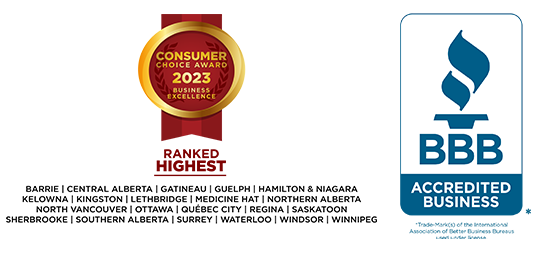5 Debts That Go Away After A Bankruptcy Or Consumer Proposal
Part of deciding whether a Bankruptcy or Consumer Proposal is right for you is knowing what kinds of debts can be included and will be discharged when the process is successfully completed. While we won’t cover every single debt here, the following list does include ones we’re commonly asked about. We hope it will help you make an informed decision about your best path toward a financial fresh start.

Taxes
Tax debt is stressful and the consequences of not looking after it are potentially severe. If you are past the point of arranging an affordable payment plan with CRA, your next step will be to explore debt solutions.
Most tax debt does go away in a bankruptcy or proposal. This includes personal income tax, GST, PST and source deductions. Different scenarios may apply for you, depending on whether you are a director of a corporation or a sole proprietor.
If you owe significant tax debt, we recommend meeting with a Licensed Insolvency Trustee to discuss your options and the processes involved.
ICBC Debts
ICBC debts often result from accidents where the debtor was at fault and / or not covered by insurance. By nature, these occur suddenly, unexpectedly and can total in the tens of thousands — if not well over a hundred thousand dollars.
A Licensed Insolvency Trustee can’t absolutely guarantee a Bankruptcy or Consumer Proposal will discharge ICBC debts, but the likelihood is very high. One word of caution, though: when including ICBC debts in your insolvency proceeding, you may face temporary ICBC restrictions — including difficulty renewing your driver’s license while in bankruptcy, obtaining a new license if it’s been lost and renewing insurance on an affordable payment plan.
In cases where you need a new license and not having one affects your ability to make a living, your employer may be able to write a letter to ICBC prompting them to re-issue one. However, insurance renewals are not restricted. Even if you don’t have ICBC debts, a lower credit rating from a Bankruptcy or Consumer Proposal may preclude you from going on a monthly insurance payment plan.
Generally, buying your insurance in three-month intervals will be the least expensive option until you rebuild your credit. For more specific information about your ICBC debts and situation, we recommend you meet with a Licensed Insolvency Trustee.
Mortgage Shortfall
When a property goes into foreclosure, it is listed and sold by the lender. Often though, the proceeds after foreclosure costs and paying out the mortgage balance result in a negative balance. This is called a mortgage shortfall and is payable immediately.
Although the amounts can vary greatly, a hefty mortgage shortfall can debilitate your future financials — especially if you already have other debts in your life. Thankfully, a Bankruptcy or Consumer Proposal can include a shortfall amount. These debts would be discharged upon successful completion of the insolvency process.
Personal Loans from Family or Friends.
Anyone you owe money to is a creditor. Whether it’s a faceless credit card company or your buddy Joe, they’re still a creditor.
During a consultation, some people are adamant about not including private loans in the conversation. It can be a sensitive and highly personal subject. Many believe a private loan is not a legitimate debt and can’t be included and discharged in a bankruptcy or proposal. This of course is not true. Your buddy Joe and the Visa card are both considered liabilities and both can and should be included in your proceeding.
It’s always best to include all debts, regardless of who the creditor is.
Payday Loans
Payday loans are one of the most difficult debts to pay off in the normal course of life due to the exorbitant interest and difficult repayment terms. Using a sizable portion of your paycheque to pay them off often leads to additional borrowing to make ends meet — creating a hamster wheel of borrowing and paying off and borrowing again, which doesn’t get you anywhere but further into debt.
Payday loans will go away in a Bankruptcy or Consumer Proposal. Regardless of the amount you owe or whether you obtained it in person at a cash store or from an online lender, include all payday loan debts.
Your Fresh Start
The insolvency process exists to financially rehabilitate honest and unfortunate debtors and provide them with a fresh financial start. Knowing what debts you can include — and will be discharged — in a Bankruptcy or Consumer Proposal is the first step toward finding relief and getting your feet back on solid ground.
If your debt has become too much to manage on your own, schedule a Free Confidential Consultation with a Licensed Insolvency Trustee today. They will review your entire financial situation, ask questions about your challenges and goals and identify opportunities for you to get rid of your debt for good.
Aside from learning about all the options at your disposal, you can also ask any questions you might have and will benefit from a qualified, government certified professional to help you make the best decision to achieve debt-free future you’ve been dreaming of.

